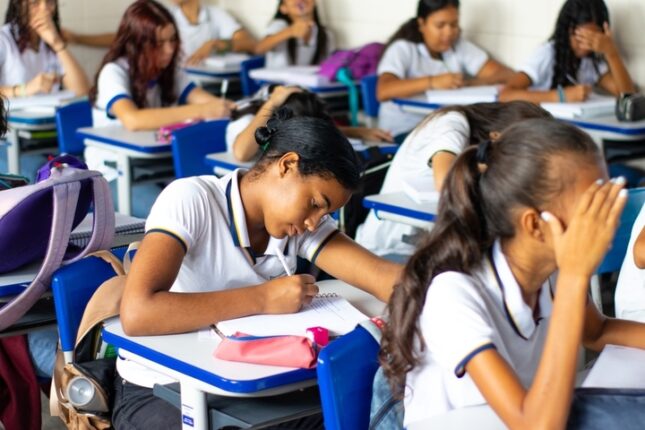-
Sexuality Censorship: Brazilian Sex Education Suppression Hurts LGBTQ Youth
July 3, 2024 By Bella Wexler
Brazil’s federally mandated, comprehensive sexuality education (CSE) is under fire. A report by Human Rights Watch (HRW) found that over the past decade, conservative groups have put forth more than 200 legislative proposals with the express intent to ban sexual orientation and gender education in primary and secondary schools.
The HRW report reviewed 217 of these bills and conducted 56 interviews with teachers and education experts to discern the political motivations and classroom impacts of this concerted effort. Its researchers found that educators’ widespread fears due to political pressure, harassment, and even personal threats had led them to limit discussions of gender and sexuality in the classroom.
Milton Ribeiro, President Bolsonaro’s third minister of education, blamed CSE for the “eroticization of children.” In the climate created by such comments, one teacher at a Rio de Janeiro high school received an anonymous death threat accusing him of “indoctrination” after providing sexual violence prevention lessons to his students. Another 8th grade teacher in Vinhedo, São Paulo faced similar accusations of “indoctrination” from the municipal government after assigning research on issues of feminism and gender-based violence on International Women’s Day to students.
The threat is pervasive. In fact, every teacher interviewed by Human Rights Watch expressed apprehension about teaching gender and sexuality concepts to students because of political pressure. Twenty of the thirty-two teachers reported facing harassment for broaching these topics between 2016 and 2020.
The Brazilian Supreme Court has rejected many proposed bans to CSE. But the political sentiments that inspire these bills, encouraged by President Bolsonaro and other conservative figures, effectively limit student access to these curricula by silencing teachers who do try to teach them.
Global precedent warns of the dangers posed to students by the absence of CSE in schools, and particularly to LGBTQ+ youth. A 2023 study published in The Journal of School Nursing deployed a rapid review methodology to map global research on how sex education curricula that center cisgender, heterosexual relationship styles and neglect alternatives (referred to as heteronormative curricula) impact LGBTQ student experiences.
The nine papers synthesized in this review explore the experiences of student populations from The Netherlands, North America, Australia, and the United Kingdom. These researchers found three core themes across schools with curricula that exclude LGBTQ specific sex education: a broader heteronormative school culture that facilitates bullying of LGBTQ students and ignorance of their needs, LGBTQ student disengagement, and LGBTQ students’ greater reliance on online resources to educate themselves on non-heterosexual relationships and sexuality.
Researchers also found that LGBTQ students developed poor sexual health literacy as a direct result of the failure of sex education curricula to reflect non-heterosexual identities. Erasure of non-heterosexual experiences in sex education curricula encourages LGBTQ student apathy towards formal sex education, and sometimes prompts them to seek out information from risky sources such as the internet and direct experiences with sexual partners. When LGBTQ students are excluded from their classroom sex education curricula and forced to seek such education elsewhere, they are left unsupported and increasingly vulnerable to abusive relationships, unintended pregnancies, sexually transmitted infections, and mental health struggles.
In Brazil, the effects of rolling back CSE are clear. Human Rights Watch cites Brazil’s high rate of gender-based violence impacting women, girls, and LGBTQ people as indicative of “a critical need” for comprehensive sexuality education. As efforts to suppress such education sweep Brazilian schools and legislative offices, global precedent warns that LGBTQ people may be hit the hardest by such restrictions.
Read More:
- Connecting the Dots: The Interplay between Education and Sexual and Reproductive Health
- Uganda’s Anti-Homosexuality Act: Criminalization’s Impact on HIV and AIDS Response
- Decolonising Sex Education
Bella Wexler is an External Relations intern at the Wilson Center and a Public Policy student at the University of Chicago.
Sources: Human Rights Watch, The Guardian, The Journal of School Nursing, Medical News Today, Sheffield Hallam University Research Archive (SHURA), American Journal of Sexuality Education
Photo Credit: Public school students in class in Aquidabã, Sergipe, Brazil. J.P. Junior Pereira/Shutterstock.com.
 A Publication of the Stimson Center.
A Publication of the Stimson Center.



